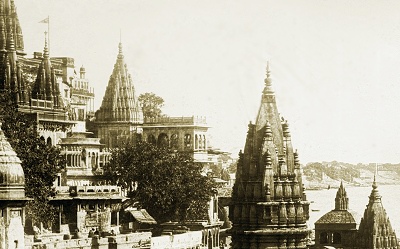Sacred Texts
Esoteric

|
Occult Science in India
by Louis Jacolliot
[1919]
|
Contents
Start Reading
Page Index
Text [Zipped]
This book was written in the 1860s, when reliable information about
Hinduism was just starting to filter back to the west.
Jacolliot was searching for the roots of western esoteric traditions
in the far East.
The high point of this book is the travelogue of his
encounters in India with a fakir, who demonstrates
his siddis (yogic powers) exuberantly.
There is also an extensive discourse on Kabbalah, and its relationship
to Eastern mystical beliefs.
Jacolliot was a diffusionist, and he believed that
many western esoteric traditions, specifically Egyptian, Jewish and Christian,
had their origin in India.
Jacolliot, the author (1837-1890) was a French lawyer who worked as a judge
in India and Tahiti.
He subsequently became a prolific author.
Although he apparently had enough familiarity with Sanskrit to do
some desultory translations of the Laws of Manu, Jacolliot was not an academic.
He quotes extensively here from a text called
the "Agrouchada-Parikchai,"
which appears to be a pastiche of the Upanishads, Hindu law books,
and a bit of Freemasonry.
This text does not seem to exist except in Jacolliot's imagination.
Jacolliot also believed in a lost Pacific continent, and was quoted by
Helena Blavatsky in Isis Unveiled in support of Lemuria.
--J.B. Hare, June 21, 2008.
Title Page
Preface
Part I. The Doctrine of the Pitris
Chapter I. The Initiated at the Ancient Temples
Chapter II. The Brahmins
Chapter III. The Brahmin—From His Birth To His Novitiate—The Ceremony of the Djita Carma
Chapter IV. The Brahmin—From His Novitiate to His Reception Into the First Degree of His Initiation
Chapter V. The First Degree of Initiation
Chapter VI. The First Degree of Initiation.—(Continued.)
Chapter VII. The Second Degree of Initiation
Chapter VIII. The Third Degree of Initiation
Chapter IX. The Grand Council
Chapter X. The Election of the Brahmatma
Chapter XI. The Yoguys
Part II. The Philosophical Tenets of the Indian Initiates
Chapter I. The Degree of Sanctity Which the Initiates Must Have Attained Before Receiving the Sacred Formula and the Fatal Secret
Chapter II. The Superior Guru—The Sacred Decade
Chapter III. The Guru—Evocations
Chapter IV. The Frontal Sign of the Initiates According to the Agrouchada-Parikchai
Chapter V. The Interpretation of the Vedas and Other Works of Sacred Scriptures
Chapter VI. Psychology of the Book of the Pitris
Chapter VII. Reason
Chapter VIII. A Text From the Vedas
Chapter IX. A Few Slocas From Manu
Chapter X. Of the Supreme Being
Chapter XI. Words Spoken by the Priests at Memphis
Chapter XII. The Formulas of Evocation
Chapter XIII. Formulas of Magical Incantation—Vulgar Magic
Part III. Compared with the Jewish Cabala, etc
Chapter I. Origin of the Cabala
Chapter II. How the Sacred Books are to be Interpreted According to the Jewish Cabalists
Chapter III. Initiation Among the Cabalists
Chapter IV. The Divine Essence, According to the Cabalists
Chapter V. The Ten Zephiroth
Chapter VI. The Cabalistic Trinity
Chapter VII. The Belief in Mediating and Inspiring Spirits According to the Jewish Cabalists
Chapter VIII. Points of Resemblance Between the Doctrine of the Pitris and That of the Zend-Avesta of Persia, the Philosophy of Plato, the Alexandrian School, and of Christianity
Part IV. Exoteric Manifestations and Demonstrations as Shown by the Fakirs
To the Reader
Chapter I. As to Who Are Initiated Into the Different Classes of Occult Power
Chapter II. Agasa
Chapter III. The Performing Fakirs
Chapter IV. The Leaf Dance
Chapter V. The Bronze Vase—Musical Accompaniments
Chapter VI. The Water-Spout—The Magic Stick
Chapter VII. Phenomena of Elevation and Knocking.
Chapter VIII. The Bamboo Stool—Aërial Flowers—The Mysterious Punkah
Chapter IX. The Stationary Table—A Shower Of Knocks—The Little Mill—Flying Feathers—The Harmoniflute
Chapter X. Sand Drawing—the Metor and the Bucket of Water—Loss of Voice—Mind Reading—Reading in a Closed Book—Aërial Melody—the Flying Palm—Leaf—Elevation of the Fakir
Chapter XI. Spontaneous Vegetation
Apparations
Chapter I. Mysterious Hands—the Production of Flowers, Crowns, etc.—Letters of Fire—The Spectre of a Priest of Brahma—the Phantom Musician
Chapter II. The Phantom of Karli
Conclusion

